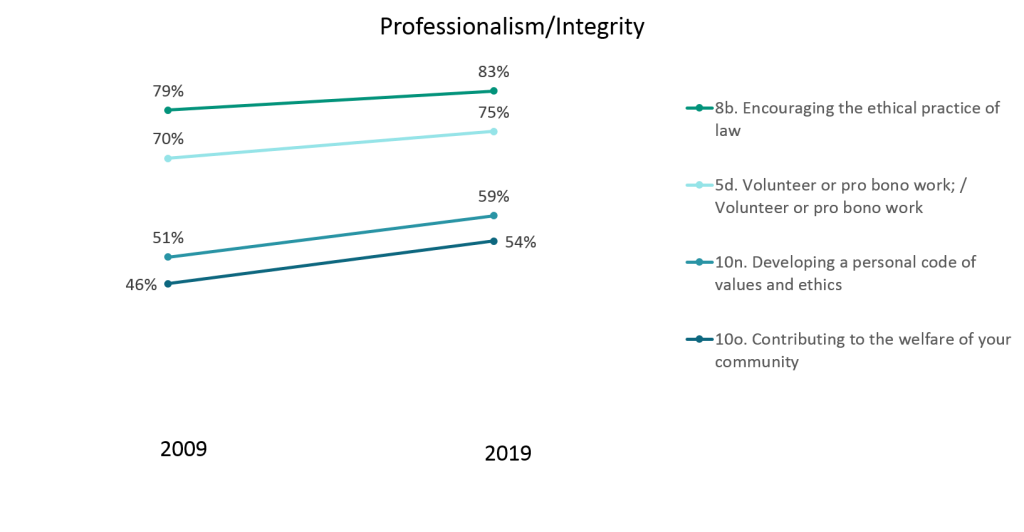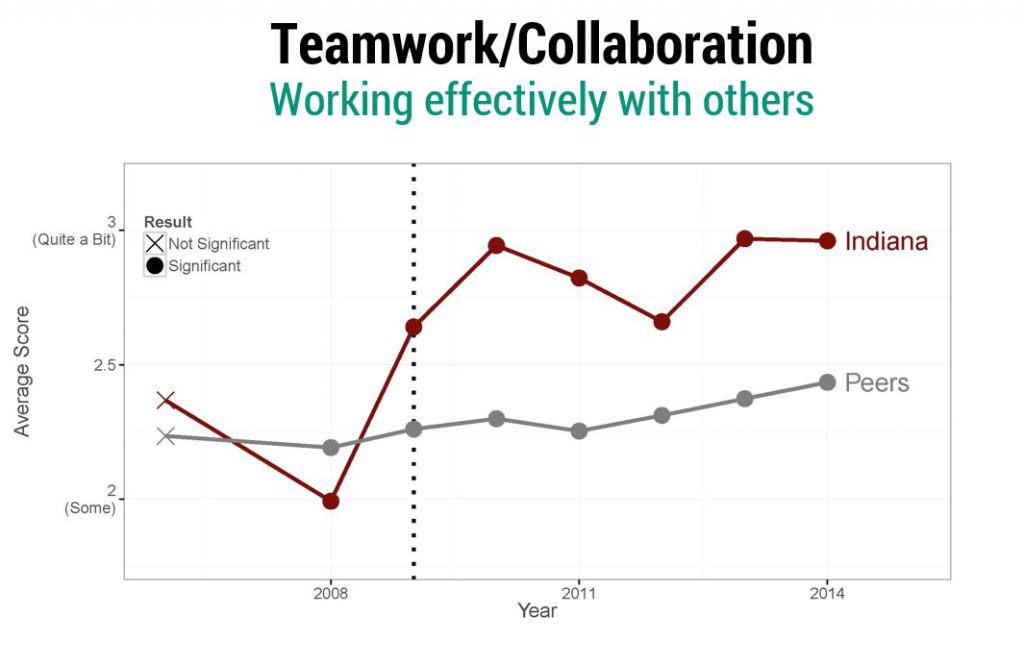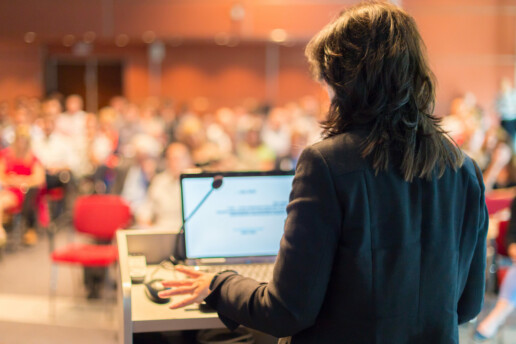Guest Post: What LSSSE Data Can Teach Us About Developing Our Law Students for Influence and Impact as Leaders
 Leah Teague
Leah Teague
Chair, AALS Section for Leadership
Associate Dean and Professor, Baylor Law School
Leah_Teague@baylor.edu
https://traininglawyersasleaders.org/
In legal education we brag about the leadership positions our graduates hold. We tell our current students they too will be leaders someday. We expect that of them. But what are law schools doing to prepare students for those roles? You might be surprised to know that we do very little in law school to intentionally develop students’ leadership acumen and skills.
One might argue that all of legal education is training for leadership. Lawyers routinely use skills developed in law schools (such as critical thinking, legal analysis and advocacy) to help others. Attorneys also serve others by strategizing, persuading, and ultimately commanding the room, whether it be the boardroom, courtroom, or public arena. These are all foundational leadership skills. So why aren’t we being more intentional about preparing our students for the leadership roles we know they will someday assume?
Perhaps more importantly, why aren’t we teaching our students about the critical leadership roles played by lawyers throughout history and the urgent need for us to continue to do so? With precious little time spent in law school on the role of lawyers in society and increasing emphasis on law as a business and lawyers as legal technicians and specialists, fewer students leave law school with an understanding of our role as protectors of the rule of law, seekers of justice, wise counselors to individuals and businesses, and effective community leaders. While understandable, considering the economic and other competing pressures on lawyers’ time today, but how ironic – and concerning – considering that the majority of law school applicants still state in their personal statements their desire to go to law school to do good – to right wrongs, stand up for those without voice or power, or to make a difference in society.
Lawyers are small in numbers. We are less than one-half of one percent of the population in America. Yet, we are still mighty in impact and influence. But that might not continue. Some are concerned that our influence is already waning. For example, in the mid-19th century, almost 80% of members of U.S. Congress were lawyers. By the 1960s this dropped to under 60%. Currently, it is about 40%. Does having fewer leaders trained and experienced in strategic planning, advocacy, negotiation and civil discourse make a difference? Don’t we need more decision-makers at all levels who are trained in the law and who understand our obligation to society as guardians of democracy?
The question for us as legal educators is how do we better prepare our students for these important roles? To address this important issue, a new Section for Leadership was approved by the American Association of Law Schools. Our section reached out to Meera Deo and Chad Christensen at LSSSE to look at what we can learn from data already being collected by LSSSE. Chad shared his thoughts and findings during a webinar on November 5, 2019.
Chad began with an overview of work being done at the Holloran Center and others to look at professional competencies touted by a series of reports (such as MacCrate and Carnegie), desired by legal employers, and now mandated by ABA Standards 302(c) and (d). Many of these professional competencies are attributes of leadership and are included in the annual LSSSE instrument, including teamwork and collaboration, professionalism and integrity, self-directedness and cultural competencies. Chad shared the specific LSSSE questions related to these attributes and discussed the findings related to those questions from 2009 to 2019. The good news is that Chad’s charts showed improvement over time in almost all of those questions. (You can view the specifics of the LSSSE questions and the results related to these leadership attributes by downloading the Webinar Slides.)

Even more exciting was the example he shared of LSSSE in action. In 2008, Indiana University (IU) 1Ls reported a significantly lower level of teamwork/collaboration than 1Ls at its peer schools. After introducing a first-year, legal professions course in 2009 that emphasized a goal-oriented, collaborative approach to legal work, IU experienced a significant improvement in that category.
 We believe the work at a growing number of law schools to introduce leadership development into their programming and curriculum not only will benefit students but also our profession and society. With that said, we are still figuring out how to be most effective and where to focus our efforts. We agree that the goal is to teach our students about the critical role lawyers play in society and our obligation as lawyers to serve, and then to better prepare them for the many opportunities they will have to serve. We want to help our students develop skills and traits that not only will enable them to be more effective in their professional roles but also will better equip them to make a meaningful difference in the lives of the individuals and organizations they serve. We also know that when they do so they will experience the kind of meaningful fulfillment that leads to satisfaction, contentment and happiness. Don’t we all want that for our students? For ourselves?
We believe the work at a growing number of law schools to introduce leadership development into their programming and curriculum not only will benefit students but also our profession and society. With that said, we are still figuring out how to be most effective and where to focus our efforts. We agree that the goal is to teach our students about the critical role lawyers play in society and our obligation as lawyers to serve, and then to better prepare them for the many opportunities they will have to serve. We want to help our students develop skills and traits that not only will enable them to be more effective in their professional roles but also will better equip them to make a meaningful difference in the lives of the individuals and organizations they serve. We also know that when they do so they will experience the kind of meaningful fulfillment that leads to satisfaction, contentment and happiness. Don’t we all want that for our students? For ourselves?
Our thanks to our co-sponsors for the webinar, LSSSE, AALS Section for Empirical Studies of Legal Education and the Legal Profession, and AALS Section on Law and the Social Sciences. We were excited to find more kindred spirits in our work! Our special thanks to Chad for his personal and vested interest in leadership development for lawyers. We look forward to further collaborations!
We invite all who are interested in introducing or expanding leadership development for law students at your school to join us. Feel free to contact me for more information at Leah_Teague@baylor.edu.

